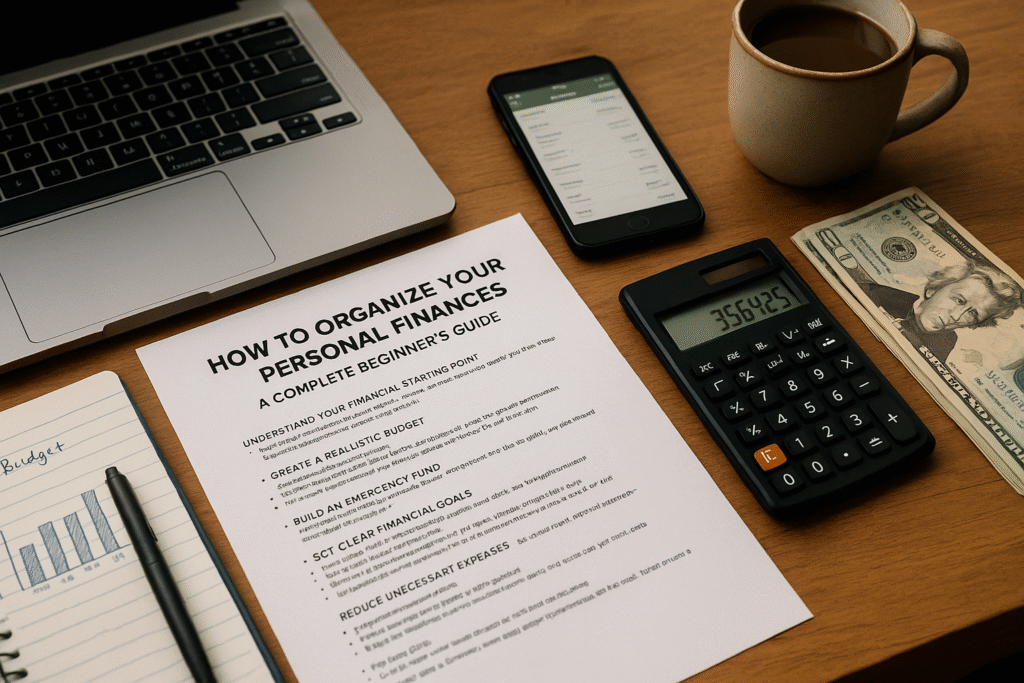Managing money is one of the most essential life skills, yet it’s rarely taught in schools. Whether you’re starting your first job, trying to pay off debt, or simply want to take control of your financial future, understanding how to organize your personal finances is the first and most important step.
In this guide, we’ll walk you through everything you need to get started from tracking your income and expenses to setting goals and building financial habits that last.
Understand Your Financial Starting Point
Before you can move forward, you need to know where you stand financially. This involves two main actions:
Track Your Income
Begin by listing all sources of income. This might include:
- Salary or wages
- Freelance or side job earnings
- Government benefits
- Passive income (like dividends or rent)
Make sure to calculate your net income what actually hits your bank account after taxes and deductions.
Know Your Expenses
Write down everything you spend money on. You can use:
- Mobile apps like Mint or YNAB
- A spreadsheet
- A handwritten notebook
Break your expenses into two categories:
- Fixed expenses (rent, loan payments, insurance)
- Variable expenses (groceries, eating out, entertainment)
Tracking for at least one full month gives you a clear picture of your spending habits.
Create a Realistic Budget
Once you know your income and expenses, it’s time to build a budget. A good starter is the 50/30/20 rule:
- 50% for needs (housing, food, transportation)
- 30% for wants (subscriptions, dining out)
- 20% for savings and debt repayment
This is just a guide — adjust it to fit your life, but ensure you’re saving and not overspending.
Build an Emergency Fund
Unexpected costs like medical bills, car repairs, or job loss can derail your financial progress. That’s why creating an emergency fund is key.
How Much to Save
Aim for 3 to 6 months of essential expenses. Start small even saving $500 is a powerful buffer.
Where to Keep It
Use a high-yield savings account so your money earns interest but remains easily accessible.
Set Clear Financial Goals
Having goals gives your money a purpose. Your goals might include:
- Paying off credit card debt
- Saving for a vacation
- Buying a car or a home
- Building retirement savings
Use the SMART framework:
- Specific
- Measurable
- Achievable
- Relevant
- Time-bound
For example: “Save $3,000 for a trip to Europe by December.”
Automate and Simplify
Automation makes personal finance easier:
- Set up automatic transfers to savings
- Use automatic bill pay to avoid late fees
- Track spending with financial apps
Small steps like these reduce stress and keep you consistent.
Reduce Unnecessary Expenses
Most people can find at least a few areas to cut costs. Ask yourself:
- Do I really use all my streaming services?
- Can I cook at home more often?
- Am I overpaying for subscriptions or banking fees?
Cancel unused services and switch to cheaper alternatives where possible.
Pay Down Debt Strategically
Debt can be a major obstacle to financial health. Focus on paying it off using one of these methods:
- Debt Snowball: Pay off the smallest debts first for motivation
- Debt Avalanche: Pay off debts with the highest interest rates first to save more
Either strategy works — choose the one that keeps you consistent.
Start Saving and Investing
It’s never too early to invest. Even small amounts grow over time thanks to compound interest.
Start with Simple Tools
- High-yield savings account for short-term goals
- Roth IRA or 401(k) for retirement
- Index funds or ETFs for long-term investing
Don’t Try to Time the Market
Investing isn’t about luck it’s about consistency. Start now, even if the amount is small, and focus on the long term.
Monitor and Adjust Regularly
Life changes — and your finances should too. Revisit your budget, goals, and expenses at least once a month.
- Did your income change?
- Are you overspending in any area?
- Can you save more this month?
Personal finance isn’t “set it and forget it.” It’s an ongoing process.
Final Thoughts: Take Control of Your Financial Future
Organizing your personal finances doesn’t require a finance degree just the willingness to learn and take consistent action. With time, discipline, and the right information, you’ll not only stay out of debt but also build wealth, security, and peace of mind.
Start today your future self will thank you.
